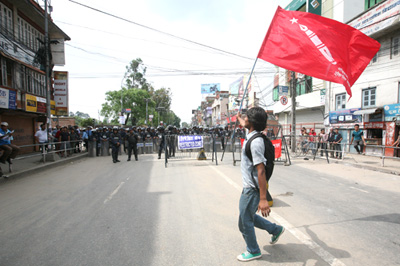 KIRAN PANDAY |
Congrats Mr Nepal and Mr Dahal, you are both supermen. But can we now� have a deal?
There is a degree of convergence on many contentious issues, but two problems persist. The first is integration and rehabilitation, where both sides have different views on numbers, process and timing. The other issue is power sharing, especially the process and timing of the government's resignation, and who the alternative PM would be.
But scratch the surface and it is clear that the core problem is of trust and intent.
The government has convinced itself that the Maoists are all out to 'capture the state'; that this is yet another instance of their duplicity and they have not changed; and if NC-UML gives in now, the Maoists will gobble up the state 'for the next 25 years'.
This has elements of truth. The Maoists do want to infiltrate the state organs, especially because the existing 'independent' institutions are completely dominated by NC-UML loyalists. Radical communists also have little faith in the idea of non-partisan institutions, for they view every structure through the class prism. And Prachanda, if he takes office, will do with a degree of unparalleled confidence.
But the argument that Maoists will 'take over' is more a reflection of the NC and UML's own lack of faith in their political strength than anything else. If NC and UML spend all their time lobbying with the Indian embassy and NA to save them, the Maoists will of course become stronger. Just look at the Madhes to see how the Maoists can be challenged on the ground. Or travel to the eastern hills and ask non-Maoist politicians if they are scared. This is a fragmented society, and� a degree of hard political work will give politicians enough ground to exploit contradictions and weaken the Maoists.
The transformation of the Maoists is a process, not an event. Keeping the Maoists out, making them insecure, and then expecting them to follow the rules of the game is an approach that will not work. And for the same forces that did not allow the Maoists to even discuss the president's step in parliament last year to talk about parliamentary supremacy is a bit rich. Politics has trumped legality every time in the last four years.
For their part, the Maoists seem to genuinely believe that NC and UML do not want the constitution; that at best, they will commit to a 1990-type constitution without monarchy; and that older parties may ally with the president to dissolve the CA. Ultra-left sections also think that since polarisation has sharpened, it is time to mount an urban insurrection.
This is as flawed as the government's perspective. Not all of NC and UML want to desert the constitutional ship. It is right-wing fragments in these parties, who have never believed in this process nor are members of the CA, who would like to restore the status quo. Ironically, Maoist protests are strengthening precisely these groups and weakening the progressives within NC and UML. In fact, there are sections within the Maoists who have an extremely unholy understanding with certain arch-conservatives, all in the name of 'nationalism'. And both these groups may want to see an end to the CA.
The Maoists also have to realise that their own actions while in government sowed deep doubts about their intent and the onus lies on them to allay those apprehensions. And an urban insurrection is not possible given both the domestic and international situation.
The protests were useful because they have given a glimpse into the existing balance of power. NC-UML should respond to popular sentiment, and Maoists need to be more reconciliatory. On that basis, they should find a common explanation for what went wrong, leading to the mistrust, and agree on a package deal for the future.
Madhav Nepal has to go, making way for a government led by an acceptable figure. And the CA � the only elected body in the country � must be saved. Anything else is a recipe for a massive confrontation, which will make this week's movement seem like a picnic.
See tomorrow's Nepali Times for more analyses of the past week's events.
Read also:
"Peaceful banda"� - From East West with Kunda Dixit
They're here - by Prashant Jha



